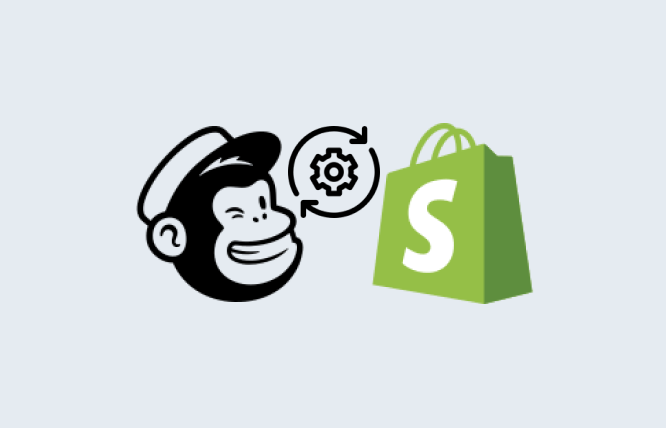Introduction
The Mailchimp Shopify integration offers a plethora of benefits. Also, as you will read in this blog, you can adopt some best practices to make the integration even more beneficial.
There is no denying the fact that effective marketing strategies are directly related to the success of a given business. Here, many experts are of the opinion that email marketing is of immense importance, as it presents a sort of direct communication with prospects and customers. It is also pertinent to mention here that the Mailchimp Shopify integration has the potential to dramatically increase your email marketing efforts. This will then pave the way for automated workflows, targeted campaigns, and a seamless synchronisation of customer data. Because of this, many often inquire about Mailchimp Shopify integration costs or even information related to Shopify and Mailchimp breakup from a host of Shopify plus agencies.
If you are searching for information regarding Mailchimp Shopify integration, then this is a must-read blog piece for you. Throughout this blog, besides getting into MailchimpShopify integration, there is also the exploration of optimisation techniques, best practices, and benefits that will enhance a company’s email marketing activities. Naturally, this means that this blog is even a great read for all those who are just beginning to grasp what email marketing is all about.
Getting to Know Mailchimp Shopify Integration
Let’s get to have a good idea regarding the essentials of Mailchimp Shopify integration. First, let’s look at the basic definition of both Mailchimp and Shopify. Mailchimp comes as a reputed email marketing platform that is well-regarded for its reliable automation features, immensely user-friendly interface and detailed template library. Now, let’s look at Shopify. This is a renowned eCommerce platform that allows today’s businesses to create their own personalised online stores, which can be used to sell goods.
It is because of the Mailchimp Shopify integration that today’s businesses can leverage customer data from their given online store. This will allow them to make targeted email campaigns. Due to this integration, the process of syncing product data, purchase history, and customer information is streamlined. The result is that marketers will be able to automate marketing workflows and present personalised content.
Positives of Mailchimp Shopify integration
Here are some of the most prominent positives of the Mailchimp Shopify integration that are often highlighted by leading enterprise technology solutions:
Personalised Marketing Campaigns
It is because of customer-rich data that today’s businesses will be able to forge highly personalised email campaigns that are crafted according to demographics, purchase behaviour, and individual preferences. Note that personalisation goes on to enhance conversion rates and engagement.
Seamless Data Synchronisation
Mailchimp Shopify integration will go on to ensure that customer information and product preferences are synched automatically between the two platforms. As a result, manual data entry will be eliminated, thereby paving the way for data accuracy.
Automated Workflows
The Mailchimp Shopify integration will allow the automation of a host of marketing workflows, such as post-purchase follow-ups, product recommendations, abandoned cart reminders, and welcome emails. It has also been witnessed that automation continues to enhance efficiency, save time, and foster customer relationships.
Improved Segmentation
Marketers have the option of segmenting their email lists depending on a host of criteria, such as engagement level, geographic location, browsing behaviour, and purchase history. Furthermore, segmentation paves the way for enhanced campaign relevance and targeted messaging.
Data-Driven Insights
Mailchimp Shopify integration offers access to reporting tools and comprehensive analytics. This will then let any given business track its email campaign’s performance, gain important insights into customer preferences and behaviour, and measure key metrics.
Mailchimp Shopify Integration – The Best Practices
If you are looking to maximise the Mailchimp Shopify integration benefits, then take note of these helpful best practices:
Implementing Custom Fields and Tags
Use custom fields and tags to get additional customer information besides the standard data fields. This may include interests, preferences, or other relevant information that could support a given personalised marketing efforts.
Permit eCommerce Tracking
Try to make sure that eCommerce tracking is allowed in both Shopify and Mailchimp. As a result, you will be able to get important data that is associated with product performance, order value, and customer purchases, which can inform a given set of targeted marketing strategies.
Segmentation Strategy
Try to create a reliable segmentation strategy, which is dependent on a host of factors such as psychographics, demographics, engagement level, and purchase history. If you are able to segment your email list, then this will pave the way for relevant and highly targeted communication with various audience segments.
Optimisation of Email Templates
Create mobile-responsive and visually appealing email templates, which should be able to properly align themselves with a brand’s identity. Feel free to try out a host of templates in order to decide which ones are the right ones and which will appropriately resonate with your audience. Another thing that should be done is the consistent monitoring of performance metrics to come across improvement areas.
Using Dynamic Content
You have the option of using Mailchimp’s dynamic content feature to create personalised email campaigns, which will dynamically adapt depending on recipient data. This may include showing a host of recommended products depending on tailoring messaging or previous purchases to particular audience segments.
A/B Testing
Perform A/B testing on a host of elements of a given email campaign, like call-to-action buttons, subject lines, or content placement. It is also important to analyse the result in order to properly recognise winning variations. This will then allow you to refine your approach to maximise conversion rates and engagement.
Techniques for Optimisation
Let’s say that you are a company that offers business management solutions and is looking to optimise your Mailchimp Shopify integration even further. If this is indeed the case, then you need to take a close look at the below-mentioned techniques:
Predictive Analysis
Equip with the ability of predictive analytics for the sake of anticipating customer preferences and behaviour. If a given business entity is able to properly note down previous demographics data, browsing behaviour, and purchase patterns, it will be in a better position to predict upcoming buying trends, thereby accordingly creating marketing strategies.
Advanced Segmentation
A given business entity can take a deep dive into customer segmentation via advanced criteria like customer lifetime value, average order value, and purchase frequency. This will then pave the way for highly targeted messaging and a more granular segmentation that is based on a segment’s special characteristics.
Lifecycle Marketing Automation
You have the option of applying lifecycle marketing automation workflows for the sake of nurturing customers in their journey, which means from the starting engagement to post-purchase follow-up. All of this may feature loyalty rewards programs, re-engagement campaigns, product recommendation emails, and welcome series emails.
Integration with Various Platforms
You may extend the ability of Mailchimp Shopify integration to a host of third-party tools and platforms. For instance, a proper degree of integration with a given customer relationship management software utility could offer a holistic view of customer interactions throughout various touchpoints and benefit a given targeted marketing activity.
Personalisation
You can leverage a host of advanced personalisation practices, such as personalised discount offers, personalised product bundles, or dynamic product recommendations. When you are able to offer timely and relevant content to a recipient, your business will stand in a better position to drive conversions and improve overall engagement.
Continuous Testing and Optimisation
Feel free to have a mindset regarding continuous optimisation. This can be done by either regularly or routinely reviewing a host of robust and reliable performance metrics, iterating on existing campaigns, and taking your time with fresh strategies. You may also want to monitor results, test various variables, and iterate depending on insights attained from data analytics.
Concluding Remarks
Throughout this blog entry, it has been rightly established that the Mailchimp Shopify integration offers a robust and reliable opportunity for today’s tech-savvy eCommerce businesses to properly optimise their email marketing activities. When there is a synchronisation of customer data, personalised content delivery, and workflow automation, a given business entity could drive conversions, significantly improve its engagement, and raise its revenue.
This is why it is safe to assume that by following today’s finest (discussed) practices and applying optimisation techniques, a given business entity will be able to enjoy the maximum potential of Mailchimp Shopify integration, thereby keeping itself in a good position in today’s highly competitive eCommerce industry.
Lastly, if you believe that you need to gain more information with regards to concepts such as Shopify and Mailchimp breakup or Mailchimp Shopify integration cost, then contact FuturByte today. They come as a reputed web development services provider that is always looking to help businesses in their attempts to better understand Mailchimp Shopify integration. You can also contact FuturByte if you want to create a state-of-the-art software solution that is fully capable of serving your business in the best possible manner.
Also Read:Hire Someone to build Shopify Store
Frequently Asked Questions
Sure, the Mailchimp Shopify integration is a reliable bond between Shopify (an eCommerce platform) and Mailchimp (an email marketing platform). This integration lets businesses create targeted email campaigns, automate marketing workflows and sync customer data depending on the Shopify store activity.Many companies that offer technology solution services are of the view that this integration can lead towards higher profitability for a given business. This is a debatable point.
The integration of Mailchimp with Shopify is basically a very simple process. All that you need to do is visit your Shopify dashboard. Once there, go to the “Apps” section, then search Mailchimp. Now, you just need to install the Mailchimp app on your device and then take steps to connect your Shopify store and your Mailchimp account.
A host of data is synced, such as order information, product data, purchase history, and customer contact information. It is because of this data that any given business entity will be able to make personalised email campaigns, thereby automating market workflows.
Have questions or feedback?
Get in touch with us and we‘l get back to you and help as soon as we can!




